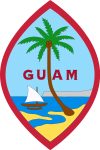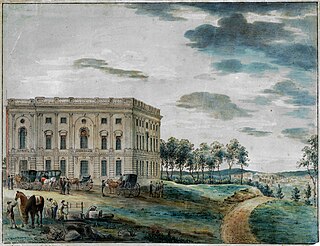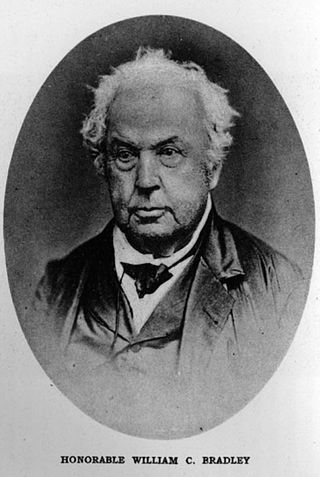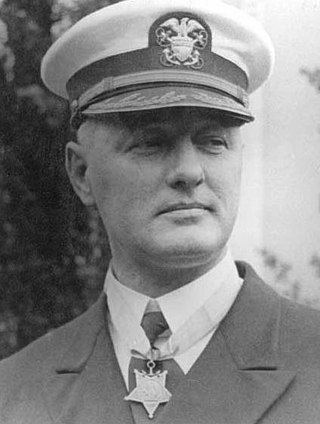 |
|---|
Parliamentary elections were held in Guam in March 1931. [1]
 |
|---|
Parliamentary elections were held in Guam in March 1931. [1]
In March 1931 Governor Willis W. Bradley dissolved the First Guam Congress, stating that it was "not functioning either as a representative body or in a manner to take full advantage of its responsibilities." [1] He issued a proclamation that created a bicameral Congress with a 27-member House of Representatives and a 15-member House of Council. Members of the House of Representatives were to serve for two years and members of the House of Council for four. [1]
The Second Guam Congress met for the first time on 2 April 1931, with Bradley opening the meeting. [1]

The 10th United States Congress was a meeting of the legislative branch of the United States federal government, consisting of the Senate and the House of Representatives. It met in Washington, D.C. from March 4, 1807, to March 4, 1809, during the seventh and eighth years of Thomas Jefferson's presidency. The apportionment of seats in the House of Representatives was based on the 1800 census; both chambers had an overwhelming Democratic-Republican majority.

Madeleine Mary Zeien Bordallo is an American-Guamanian politician who served as the delegate to the U.S. House of Representatives for Guam's at-large congressional district from January 3, 2003 to January 3, 2019.

Antonio Borja Won Pat was a Guamanian politician and member of the Democratic Party of Guam. He served as the first Delegate from Guam to the United States House of Representatives from 1973 to 1985.
In the United States House of Representatives, a Committee of the Whole House is a congressional committee that includes all members of the House. In modern practice there is only one such committee, the Committee of the Whole House on the State of the Union, which has original consideration of all bills on the Union Calendar. While assembled, the House may resolve itself temporarily into a Committee of the Whole House. Business can then proceed with various procedural requirements relaxed. At the conclusion of business, the committee resolves to "rise" and reports its conclusions or lack of conclusion to the speaker.

The 72nd United States Congress was a meeting of the legislative branch of the United States federal government, consisting of the United States Senate and the United States House of Representatives. It met in Washington, D.C. from March 4, 1931, to March 4, 1933, during the last two years of Herbert Hoover's presidency. The apportionment of seats in this House of Representatives was based on the 1910 United States census. The Senate had a Republican majority. The House started with a very slim Republican majority, but by the time it first met in December 1931, the Democrats had gained a majority through special elections.
Non-voting members of the United States House of Representatives are representatives of their territory in the House of Representatives, who do not have a right to vote on proposed legislation in the full House but nevertheless have floor privileges and are able to participate in certain other House functions. Non-voting members may vote in a House committee of which they are a member and introduce legislation.

The 71st United States Congress was a meeting of the legislature of the United States federal government, consisting of the United States Senate and the United States House of Representatives. It met in Washington, D.C. from March 4, 1929, to March 4, 1931, during the first two years of Herbert Hoover's presidency. The apportionment of seats in the House of Representatives was based on the 1910 United States census.
The Guam Organic Act of 1950, is a United States federal law that redesignated the island of Guam as an unincorporated territory of the United States, established executive, legislative, and judicial branches, and transferred federal jurisdiction from the United States Navy to the United States Department of the Interior. For the first time in over three hundred years of foreign colonization, the people of Guam had some measure of self-governance, however limited. Before that time there was some participation in the Local Administration, through the mayors or "gobernadorcillos" in Spanish times, who acted under the supervision of the Governor of the Mariana Islands.

William Czar Bradley was an American lawyer and politician. He served as U.S. Representative from Vermont.

Willis Winter Bradley Jr. was a Naval officer, a recipient of the Medal of Honor, Naval Governor of Guam, and a U.S. Representative from California.
General elections were held in Guam on 4 November 2008. Voters in Guam chose their non-voting delegate to the United States House of Representatives, as well as members of the territorial legislature. The election coincided with the 2008 United States elections.

The 1790–91 United States Senate elections were held on various dates in various states. These U.S. Senate elections occurred during the first midterm election cycle, which took place in the middle of President George Washington's first term. As these elections were prior to the ratification of the Seventeenth Amendment in 1913, senators were chosen by state legislatures. Senators were elected over a wide range of time throughout 1790 and 1791, and a seat may have been filled months late or remained vacant due to legislative deadlock. In these elections, terms were up for the nine senators in Class 1.

The 2014 United States House of Representatives elections in New Hampshire were held on Tuesday, November 4, 2014 to elect the two U.S. representatives from the state of New Hampshire, one from each of the state's two congressional districts. The elections coincided with the elections of other federal and state offices, including governor of New Hampshire and U.S. senator.
This election marked the first time since 1992 that New Hampshire elected members of two parties into the House of Representatives, and as of 2021, it is the most recent time a Republican has been elected to Congress in New Hampshire.

Michael Franklin Quitugua San Nicolas is a Guamanian Democratic Party politician, who served as the delegate to the U.S. House of Representatives for Guam's at-large congressional district from 2019 to 2023. San Nicolas was elected by his colleagues in the 116th United States Congress to serve as vice chair of the United States House Committee on Financial Services. Rather than run for reelection in 2022, San Nicholas ran and lost in the Democratic primary of the 2022 Guamanian gubernatorial election. From 2013 to 2019, San Nicolas served as senator in the 32nd, 33rd, and 34th Guam legislatures.

A general election was held in Guam on Tuesday, November 6, 2018. Voters in Guam chose their governor, their non-voting delegate to the United States House of Representatives, attorney general, public auditor, as well as all fifteen members of the territorial legislature. The election coincides with the United States mid-term elections.

The Congress of Micronesia was a bicameral legislature in Trust Territory of the Pacific Islands from 1964 to 1979.

The 2022 United States House of Representatives election in Guam was held on Tuesday, November 8, 2022, to elect the non-voting Delegate to the United States House of Representatives from Guam's at-large congressional district. The election coincided with the elections of other federal and state offices, including the larger 2022 United States House of Representatives elections and the 2022 Guamanian legislative election.
Guam is an island in the Marianas archipelago of the Northern Pacific located between Japan and New Guinea on a north–south axis and Hawaii and the Philippines on an east–west axis. Inhabitants were Spanish nationals from 1521 until the Spanish–American War of 1898, from which point they derived their nationality from United States law. Nationality is the legal means in which inhabitants acquire formal membership in a nation without regard to its governance type. In addition to being United States nationals, people born in Guam are both citizens of the United States and citizens of Guam. Citizenship is the relationship between the government and the governed, the rights and obligations that each owes the other, once one has become a member of a nation. Though the Constitution of the United States recognizes both national and state citizenship as a means of accessing rights, Guam's history as a territory has created both confusion over the status of its nationals and citizenship and controversy because of distinctions between jurisdictions of the United States.
Sue Worthington Bradley was the American First Lady of Guam from 1929 to 1931. She was the wife of naval Governor of Guam Willis W. Bradley.

James Camacho "Jim" Moylan is a Guamanian politician serving as the delegate to the U.S. House of Representatives for Guam. He became a member of the Guam Legislature in 2019 and was elected to the U.S House of Representatives in the 2022 United States midterm elections.